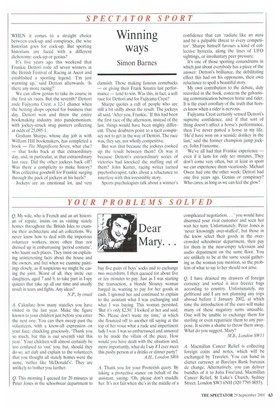Winning ways
Simon Barnes
WHEN it comes to a straight choice between cock-up and conspiracy, the wise historian goes for cock-up. But sporting historians are faced with a different dichotomy: cock-up or genius?
It's five years ago this weekend that Frankie Dettori rode all seven winners at the British Festival of Racing at Ascot and established a sporting legend. 'I'm just warming up,' said Dettori afterwards. 'Is there any more racing?'
We can allow genius to take its course in the first six races. But the seventh? Dettori rode Fujiyama Crest, a 12-1 chance when the betting shops opened for business that day. Dettori won and threw the entire bookmaking industry into pandemonium, with jockey-struck mug punters collecting at odds of 25,095-1.
Graham Sharpe, whose day job is with William Hill bookmakers, has completed a book — The Magnificent Seven, what else? — that looks back at that extraordinary day, and, in particular, at that extraordinary last race. Did the other jockeys back off? Was there a complicity to make history? Was collective goodwill for Frankie surging through the pack of jockeys at his heels?
Jockeys are an emotional lot, and very clannish. Those making famous comebacks — or giving their Frank Sinatra last performance — tend to win. Was this, in fact, a soft race for Dettori and for Fujiyama Crest?
Sharpe quotes a raft of people who are still a bit sniffy about the result. The jockeys all said, 'After you, Frankie.' If this had been the first race of the afternoon, instead of the last, things would have been mighty different. These doubters point to a tacit conspiracy not to get in the way of Dettori. The race was, they say, not wholly competitive.
But was that because the jockeys cooked up the result between them? Or was it because Dettori's extraordinary series of victories had knocked the stuffing out of them? John Karter, racing writer turned psychotherapist, talks about a reluctance to interfere with this irresistible story.
Sports psychologists talk about a winner's confidence that can 'radiate like an aura and be a palpable threat to every competitor'. Sharpe himself favours a kind of collective hysteria, along the lines of UFO sightings, or involuntary peer pressure.
It's one of those sporting conundrums in which just about everybody has a piece of the answer; Dettori's brilliance, the debilitating effect this had on his opponents, their own reluctance to spoil a beautiful story.
My own contribution to the debate, duly recorded in the book, concerns the galvanising communication between horse and rider. It is the exact corollary of the truth that horses know when a rider is nervous.
Fujiyama Crest certainly sensed Dettori's supreme confidence, and if that sort of thing doesn't affect a horse's performance, then I've never patted a horse in my life. 'He'd have won on a seaside donkey in the last,' said the former champion jump jockey, John Francome.
We've all had that Frankie experience — even if it lasts for only ten minutes. They don't come very often, but at least in sport we can experience them vicariously, Michael Owen had one the other week; Dettori had one five years ago. Genius or conspiracy? Who cares, as long as we can feel the glow?






































































 Previous page
Previous page